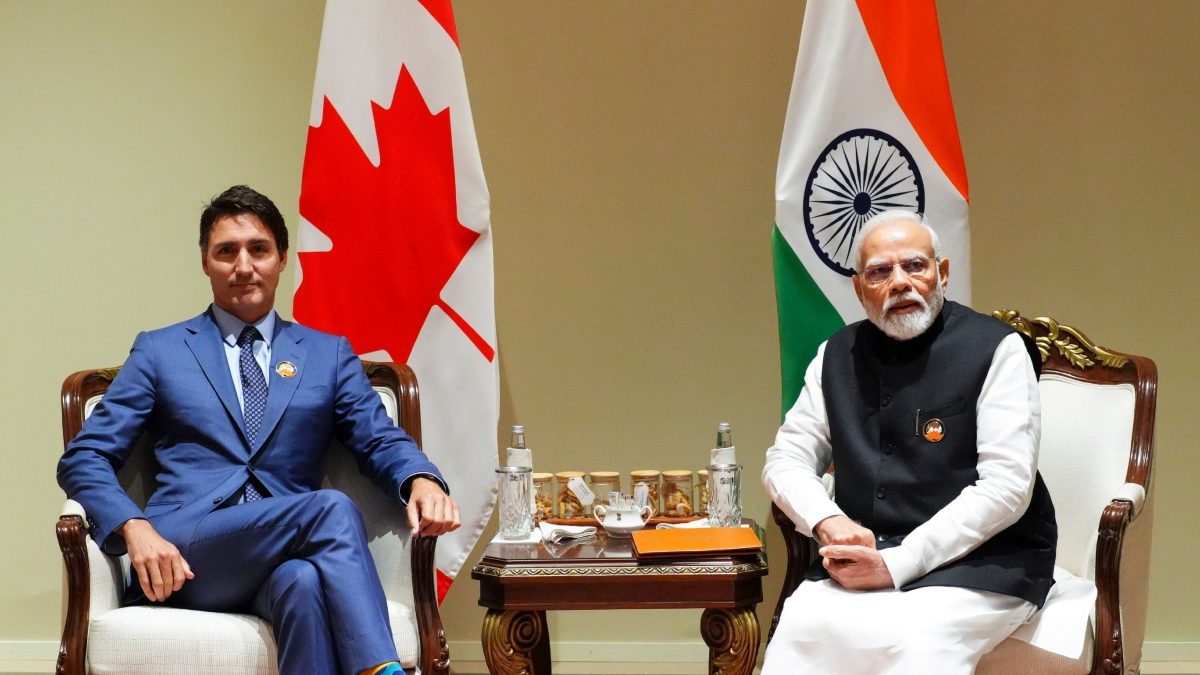Canadian Prime Minister Justin Trudeau stated that he has discussed Khalistan extremism and foreign interference with Prime Minister Narendra Modi multiple times over the years, emphasizing Canada's commitment to protecting freedom of expression and peaceful protest while also preventing violence and opposing hatred.
Indian Prime Minister Narendra Modi expressed concerns about protests in Canada against India during a meeting with Canadian Prime Minister Justin Trudeau at the G20 summit in New Delhi.
Canadian Prime Minister Justin Trudeau described India as an "extraordinarily important" economy and a significant partner in various sectors, including combating climate change and fostering economic growth. He also highlighted Canada's commitment to defending peaceful protests while opposing violence and hatred, emphasizing that the actions of a few do not represent the entire community or the country.
Canadian Prime Minister Justin Trudeau has expressed his concerns and called for investigation into the potential link between Indian government agents and the killing of a Sikh-Canadian activist, emphasizing that any involvement of a foreign government in the killing of a Canadian citizen on Canadian soil is an unacceptable violation of sovereignty.
Canadian Prime Minister Justin Trudeau's allegations of Indian government agents being linked to the assassination of Khalistani leader Hardeep Singh Nijjar have strained relations between India and Canada, impacting trade talks and potentially affecting the economic interests of Sikh families in India's state of Punjab, who have relatives in Canada.
Canada's Prime Minister Justin Trudeau stated that Canada is not attempting to provoke India but wants New Delhi to address the issue of the alleged link between Indian agents and the murder of a Sikh separatist leader.
Tensions between India and Canada escalate over the murder of a Sikh leader, with each nation expelling one of the other's diplomats and Canada investigating potential involvement of Indian government agents in the murder, prompting India to urge its nationals in Canada, especially students, to exercise caution.
India has accused Canada's government of failing to act on evidence of Khalistani terrorist Hardeep Singh Nijjar's crimes, despite sharing the information "countless times."
Canada's defense minister, Bill Blair, affirmed Canada's commitment to pursuing partnerships with India while the investigation into the killing of a Khalistani leader continues, despite tensions between the two countries arising from allegations made by Canadian Prime Minister Justin Trudeau of potential Indian involvement in the killing.
Justin Trudeau's game plan in escalating matters with India based on allegations is related to the activities of separatist Khalistanis and alleged Indian interference in Canada.
A viral video from the Canadian parliament shows Canadian opposition leader accusing Prime Minister Justin Trudeau of damaging Indo-Canadian ties due to allegations against the Indian government.
The United States supports Canada's investigation into the murder of Hardeep Singh Nijjar and urges the Indian government to cooperate in the Canadian investigation.
Khalistan supporters in Canada organize demonstrations outside India's diplomatic mission following Prime Minister Trudeau's statement on a potential connection between New Delhi and the assassination of Khalistani leader Hardeep Singh Nijjar; tensions rise between India and Canada.
India's External Affairs Minister, Jaishankar, criticized Canada at the UN General Assembly, accusing them of responding to terrorism based on political convenience, in the midst of the two countries' dispute over the killing of Khalistani terrorist Hardeep Singh Nijjar.
India's External Affairs Minister, S Jaishankar, has responded to allegations made by Canada regarding India's potential involvement in the killing of a Khalistani separatist, stating that it is not the policy of the Indian government and that they are open to examining specific and relevant information in the case.
Indian Foreign Minister Subrahmanyam Jaishankar expressed concern over violence and intimidation faced by Indian diplomats in Canada due to the presence of Sikh separatist groups, as tensions between the two countries continue to escalate.
Canada is being criticized for harboring individuals with strong links to pan-Khalistani extremist activities, according to India's intelligence dossier.
Canada-India relations have deteriorated over Ottawa's failure to act on New Delhi's request to crackdown on radical Sikhs and terror cells, and Prime Minister Justin Trudeau's claims of Khalistani terrorism have worsened the situation, despite Canada's inability to provide any evidence.
Canadian Prime Minister Justin Trudeau was confronted by an angry citizen who accused him of ruining the country and criticized his handling of various issues, including the national housing crisis and carbon pricing, in a viral video that has sparked significant social media backlash.
India and Canada are facing increasing diplomatic tensions over the killing of Khalistani extremist Hardip Singh Nijjar, causing concerns from other countries including the UK, which has called for de-escalation and respect for the rule of law.
The geopolitical rift between Canada and India has escalated after Canadian Prime Minister Justin Trudeau accused the Indian government of involvement in the killing of a Canadian Sikh activist, leading to accusations from India that Canada supports "anti-India activities" and harbors terrorists, with Canada's allies in the Five Eyes intelligence-sharing network now considering their next moves.
